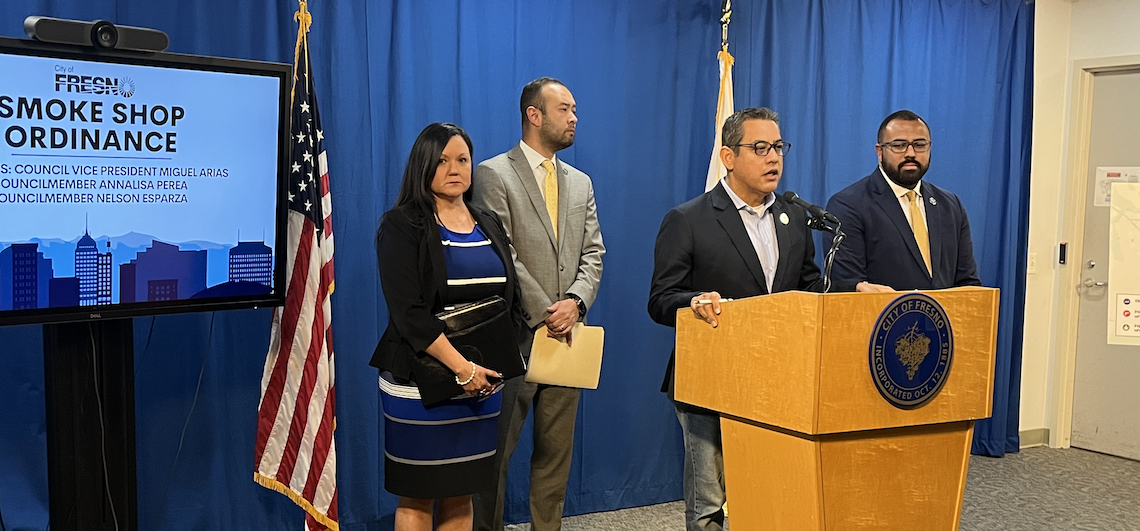
Fresno City Council Vice President Miguel Arias speaks to the media Tuesday, March 11, 2025 at a news conference announcing a new smoke shop ordinance. Photo by Frank Lopez
Written by Frank Lopez
Fresno City Council Vice President Miguel Arias and Councilmember Nelson Esparza held a news conference Tuesday to announce their proposal to reduce the number of smoke shops in the city.
The change would require smoke shops to operate with a conditional use permit provided they are not located within 1,000 feet of so-called “sensitive” areas such as schools, parks and daycare centers.
“That’s the same requirement we have for alcohol licenses and for cannabis operators,” Arias said.
The councilmembers said ongoing sweeps of such retail stores in Fresno have uncovered evidence of the sale of illegal cannabis and tobacco products, sales to minors, gambling, human trafficking and connections to gang activity.
When originally introduced in October 2023, the ordinance aimed to reduce the number of smoke shops in the city from 119 to 14, or two per council district.
Councilmember Annalisa Perea was also a sponsor of the ordinance.
Arias said the proposal has been through “extensive” review and has the support of neighborhood groups, the Fresno Planning Commission, the Fresno Chamber of Commerce, local school districts, youth organizations and community leaders.
The latest amendment raises the limit of smoke shops from the original limit of two per district to seven for a total of 49 in the city.
There are currently 140 “identified” smoke shops across the city, with 67 of them having been inspected by code enforcement. Arias said he uses the term “identified” because the current smoke shops are not registered and the majority of them do not have a business permit.
Out of the 67 shops inspected, 63 were selling illegal tobacco, 53 were selling illegal cannabis products and guns were found in 15 of them, Arias said.
Arias said 100% of the shops inspected were found with code violations.
Any business caught engaging in activities such as gambling, cannabis sales or human trafficking would see an immediate revocation of license under this proposal, he assured.
“We will not be going through the lengthy process that takes a significant amount of public resources to be able to close them down,” Arias said.
Arias said that many smoke shops in Fresno circumvent current conditional use permit requirements by rebranding as a grocery market or clothing store.
High concentration
Esparza said his District 7 has the highest concentration of smoke shops in Fresno, and the widespread availability of tobacco, nicotine and vaping products near sensitive use areas is concerning.
“Our children are facing a public health crisis that we must put an end to,” Esparza said. “Our city is experiencing an unnecessary amount of blight as a result of all of these smoke shops proliferating within the city boundaries.”
He added that this proposal will result in safer neighborhoods and reflect extensive community feedback to curb nicotine addiction and protect youth.
Esparza said smoke shops in the city create hotspots for crime and blight, with the Fresno Police Department responding to 1,184 calls for service at smoke shops alone.
Shop owners fired up
About 40 smoke shop owners and operators as well as tobacco and vape distributors attended an industry input meeting on Jan. 23, after the Fresno Planning Commission rejected the ordinance, sending it back to the council for revision.
The plan would give existing owners not seeking a conditional use permit 18 months to remain open and sell off inventory before closing.
According to a summary of the meeting from city staff, smoke shop owners said forcing businesses to shut down would impact families and could increase unemployment rates.
They said the process conflicts with city code that allows existing businesses to be “grandfathered in.”
They also said they should not be required to apply for a conditional use permit, which would cost $10,000. They already obtain multiple licenses from various governmental agencies, they said.
The group argued the fees are too high.
Loitering requirements included in the proposal are difficult for operators to enforce, especially in shopping centers, smoke shop owners said.
The state already regulates and inspects smoke shops, they added.
Some property owners may not allow the required installation of exterior security cameras, which could make it difficult for some smoke shops to comply with safety requirements, they said.
Illegal cannabis products that businesses are being cited for selling are legal CBD products, they argue. The group said city staff, including code enforcement and police, should be trained in identifying products for their legality.
Timeline
The proposal will go before city council this Thursday, and if passed, will be adopted on March 27 and go into effect on April 27.








